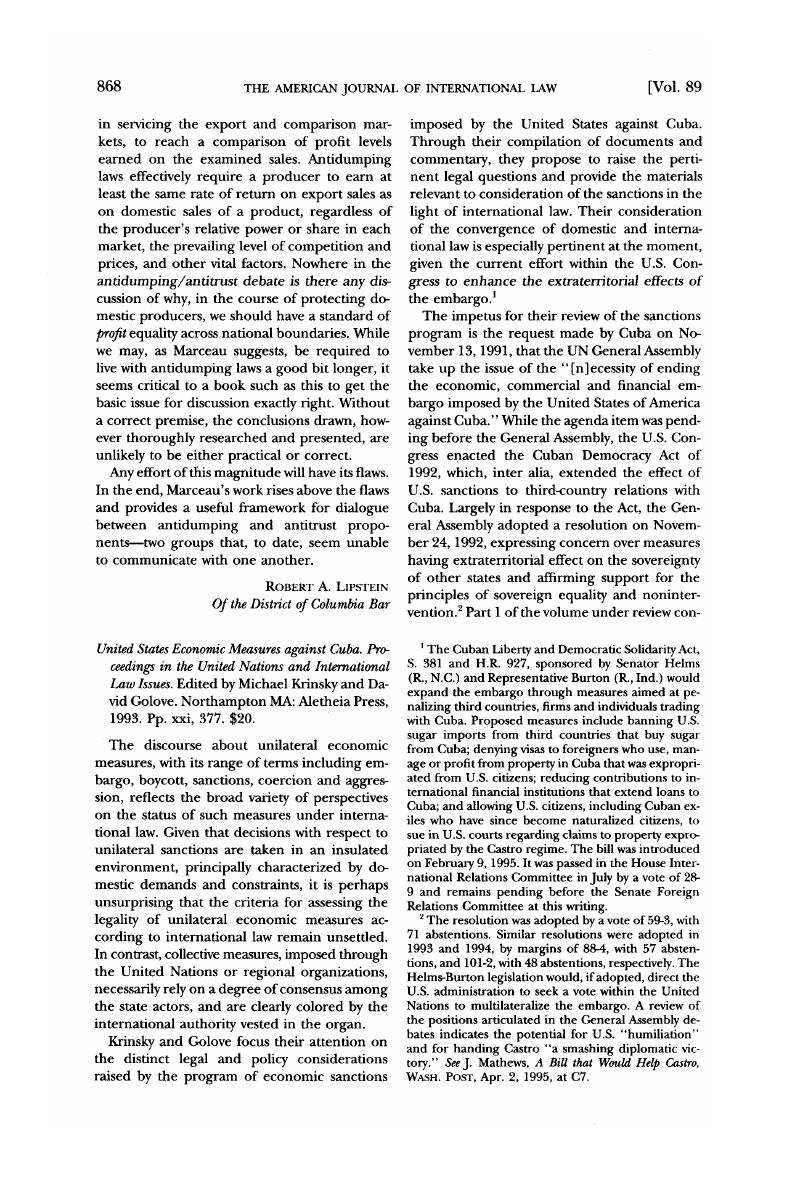No CrossRef data available.
Published online by Cambridge University Press: 27 February 2017

1 The Cuban Liberty and Democratic Solidarity Act, S. 381 and H.R. 927, sponsored by Senator Helms (R., N.C.) and Representative Burton (R., Ind.) would expand the embargo through measures aimed at penalizing third countries, firms and individuals trading with Cuba. Proposed measures include banning U.S. sugar imports from third countries that buy sugar from Cuba; denying visas to foreigners who use, manage or profit from property in Cuba that was expropriated from U.S. citizens; reducing contributions to international financial institutions that extend loans to Cuba; and allowing U.S. citizens, including Cuban exiles who have since become naturalized citizens, to sue in U.S. courts regarding claims to property expropriated by the Castro regime. The bill was introduced on February 9, 1995. It was passed in the House International Relations Committee in July by a vote of 28–9 and remains pending before the Senate Foreign Relations Committee at this writing.
2 The resolution was adopted by a vote of 59-3, with 71 abstentions. Similar resolutions were adopted in 1993 and 1994, by margins of 88-4, with 57 abstentions, and 101-2, with 48 abstentions, respectively. The Helms-Burton legislation would, if adopted, direct the U.S. administration to seek a vote within the United Nations to multilateralize the embargo. A review of the positions articulated in the General Assembly debates indicates the potential for U.S. “humiliation” and for handing Castro “a smashing diplomatic victory.” See J. Mathews, A Bill that Would Help Castro, WASH. POST, Apr. 2, 1995, at C7.
3 The crisis situation triggered the wooing of Canadian, Mexican and European investors, which in turn precipitated the current legislative counterattack. A recent report described the Helms-Burton bill as Congress’s attempt “to build a wall of lawsuits around the Cuban economy, which Mr. Castro has been trying to save by inviting in overseas investors.” A Davis, Helms to Cuba: See You in Court, NAT’L L.J., July 10, 1995, at 1.
4 The Statement of Administrative Action delivered to Congress with the implementing bill explicitly states uiat nodiing in the Agreement would diminish the sanctions program or prevent its full enforcement. The Helms-Burton bill, which aims at penalizing diird countries trading with Cuba, provoked a formal protest to die Department of State by Canada, which warned that certain draft provisions appear to violate NAFTA and die WTO Agreement. See Canada Delivers Note over Proposed Cuba Bill, OTTAWA CITIZEN, Mar. 25, 1995.
5 See Select Revenue Measures and Free Trade with Cuba Act: Hearings Before the Subcomm. on Trade and Select Revenue of the House Comm. on Ways and Means (Mar. 17, 1994) (testimony of Jorge I. Dominguez).
6 See generally presentations of Laurence Boisson de Chazournes and W. Michael Reisman on “The Costs and Benefits of Economic Sanctions: The Bottom Line,” 88 ASIL PROC. (forthcoming 1995) (suggesting role of human rights, humanitarian norms in decision making and evaluation of (primarily lateral) sanctions).
7 Cf. Domingo E. Acevedo, The U.S. Measures Against Argentina Resulting from the Malvinas Conflict, 78 AJIL 323 (1984).
8 Canada has already threatened unspecified trade retaliation, should the Libertad bill be passed. See Canada Set to Retaliate Against U.S. Bill to Limit Trade with Cuba, Official Says, 12 Int’l Trade Rep. (BNA) No. 20, at 865 (May 17, 1995).